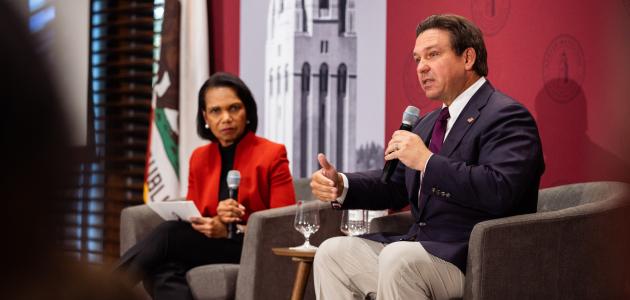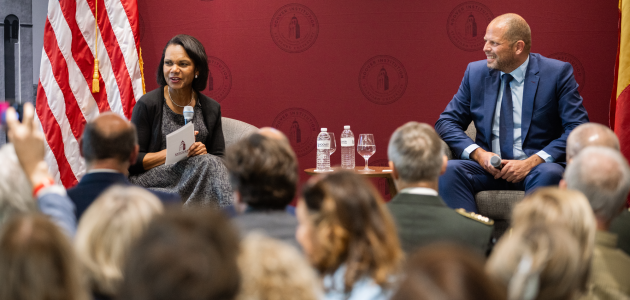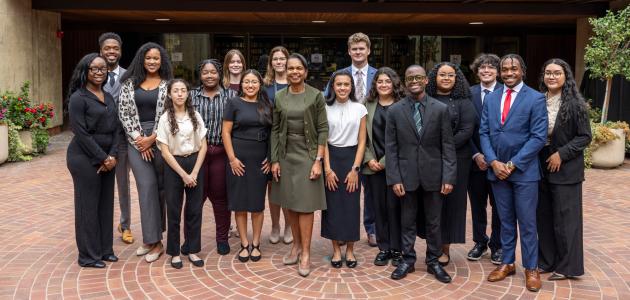The future of the controversial No Child Left Behind (NCLB) Act was discussed at the Koret Task Force on K–12 Education’s annual dinner January 17 at the Hoover Institution. In a before-dinner discussion hosted by Hoover senior fellow and task force chairman Chester E. Finn, eight members of the task force offered policy recommendations regarding the much-debated federal law.
The main goal of the law, which is currently up for reauthorization by Congress, is that all students achieve proficiency in reading and mathematics by the end of the 2013–14 school year. As most of the task force noted during their annual meeting at Hoover, after a celebrated start, NCLB became increasingly unpopular with state and local educators, with some critics describing it as “all stick and no carrot.” In addition, groups such as the National Educational Association (NEA) have complained that the law does not provide adequately for schools in order for them to meet demands placed on them by the law. On January 7, a panel of the U.S. Court of Appeals for the 6th Circuit, in Cincinnati, agreed to hear an NEA lawsuit demanding that the government pay the costs of its own rules and regulations under NCLB.
The discussion by task force members covered a wide range of concerns, from accountability to funding to proficiency. In response to a question about why people are agitated about NCLB, Hoover senior fellow Terry Moe cited the usual concerns, such as too much testing and schools being unfairly measured. “Underlying it all is the more fundamental thing [that] most teachers and educators don’t want to be held accountable,” he said.
Caroline Hoxby, Hoover senior fellow, said she gave no credence to accusations that the program is underfunded; pointing out that testing—the main component of the program—is “inexpensive.” Responding to Hoxby, Hoover fellow Eric Hanushek, the Paul and Jean Hanna Senior Fellow in Education, added that funding is a concern because schools are being asked to do more as a result of NCLB.
Replying to a question as to whether Congress will reauthorize NCLB before the next election, Hoover distinguished visiting fellow John Chubb said, “politics is the toughest part of public schools, in general, and a critical problem with respect to No Child Left Behind.” He added that those who would most benefit from the law are students in inner-city schools who are represented by Democrats who, in turn, represent teachers’ unions, who vigorously oppose it. Republicans, who support accountability, represent suburban areas where proficiency is not an issue, so it’s difficult to get them behind it. He also said that where NCLB goes from here could be troubling.
Hanushek added that determining proficiency may not be feasible because the definition is open, but advocated for setting minimum standards. On the question of whether standards should be determined state by state or at the national level, Hoover senior fellow Paul E. Peterson said establishing national standards has not been part of an American tradition and it would be incredibly difficult to do. Chubb added that NCLB is unusual in that it does call for proficiency standards; such standards are difficult to establish, but it was vital the conation needs to strive for them.
Questions regarding NCLB’s ability to achieve its goals were discussed next. Hoover senior fellow Diane Ravitch said she agreed with concerns expressed by others that NCLB narrows K-12 curriculum and places other constraints on schools. During the past five years, she said that curriculum has changed and testing has become constant but that scores have not significantly improved. She added that, “to ensure that students are more competitive, we need better education, not more testing.” Herbert Walberg, Hoover distinguished visiting fellow, expressed skepticism over the capability of the federal government to intervene effectively in local schools.
The last question went to Hoover distinguished visiting fellow Paul T. Hill concerning proposals by some congressional representatives to turn NCLB over to the states. In response, Hill said he thought it would be a big step backward. NCLB was badly crafted in many ways, he said, but Hill believes the Act’s “big architecture is absolutely essential” and he would hate to see it lost.













